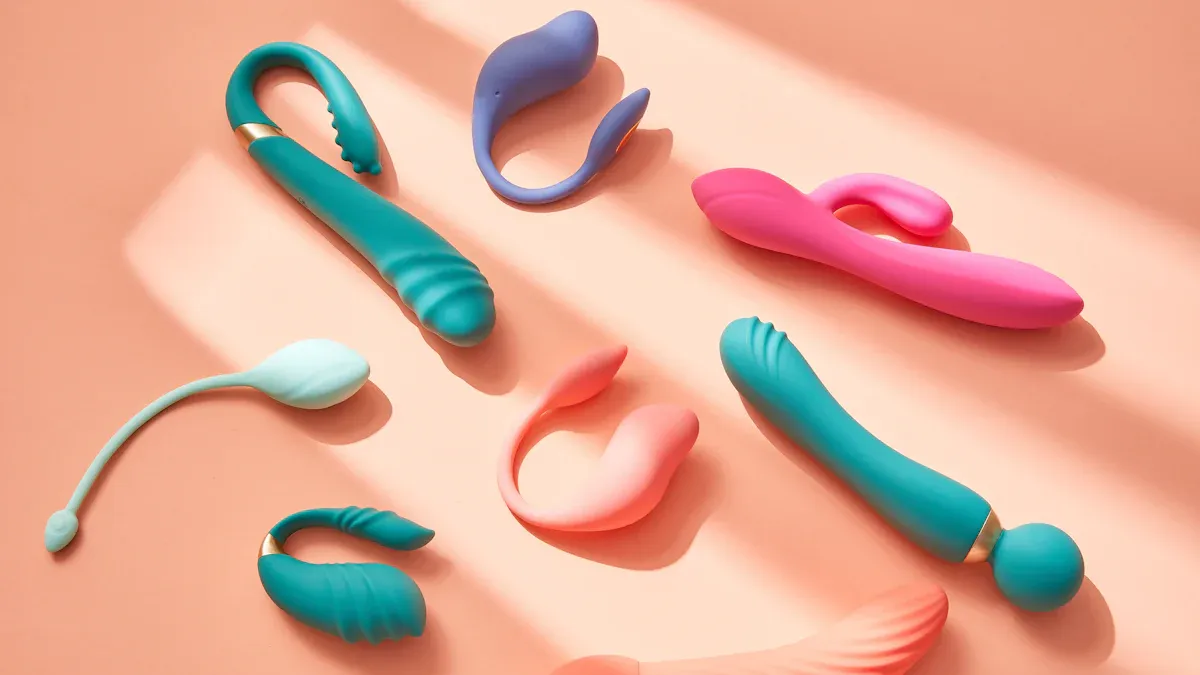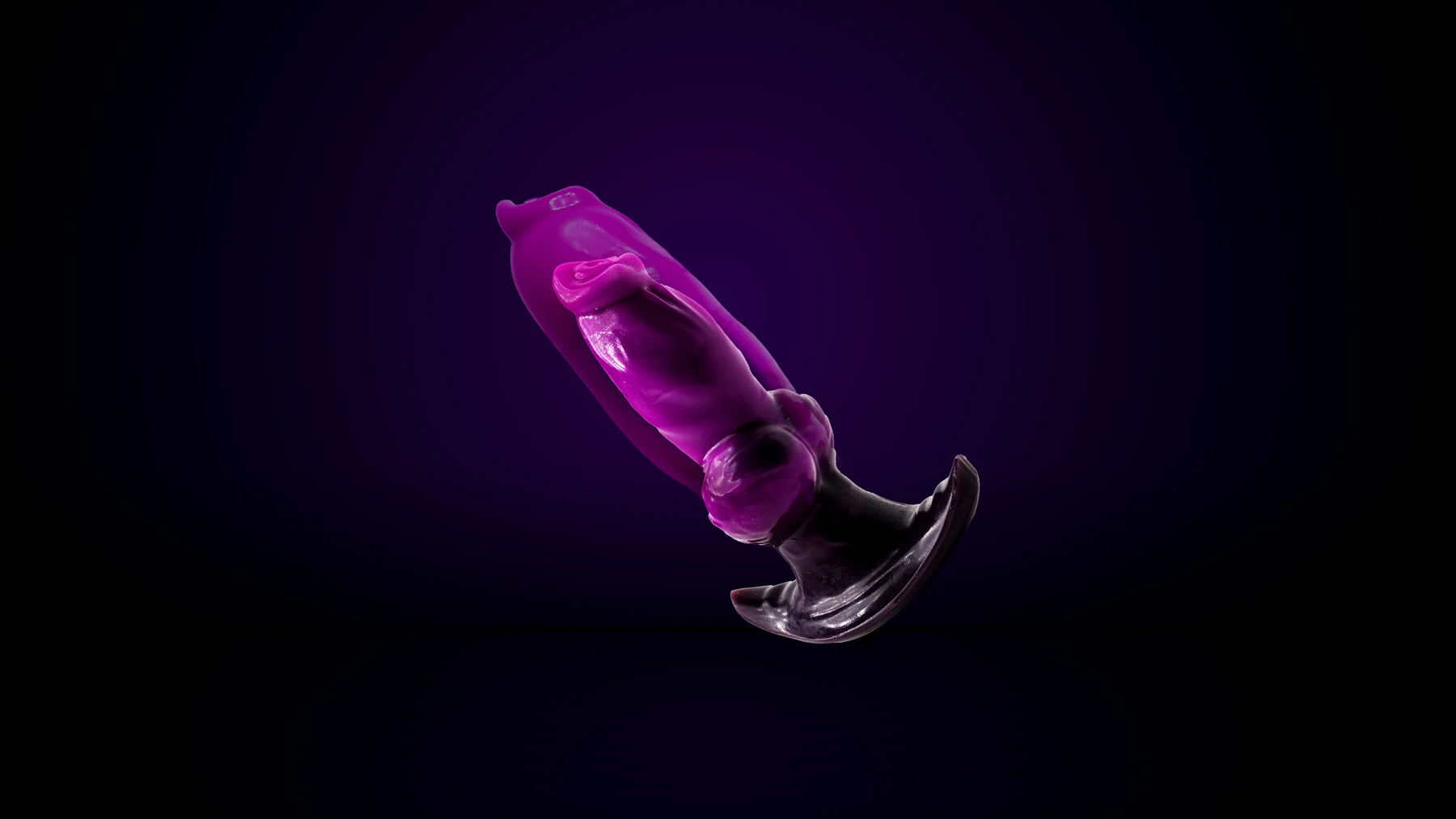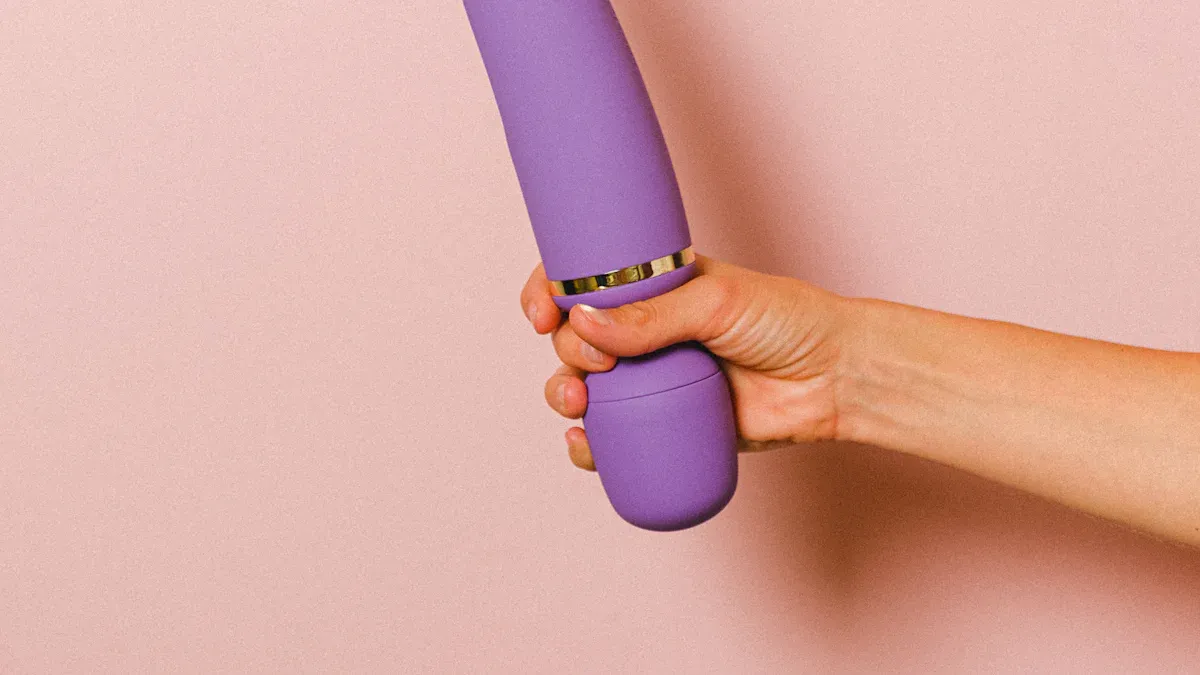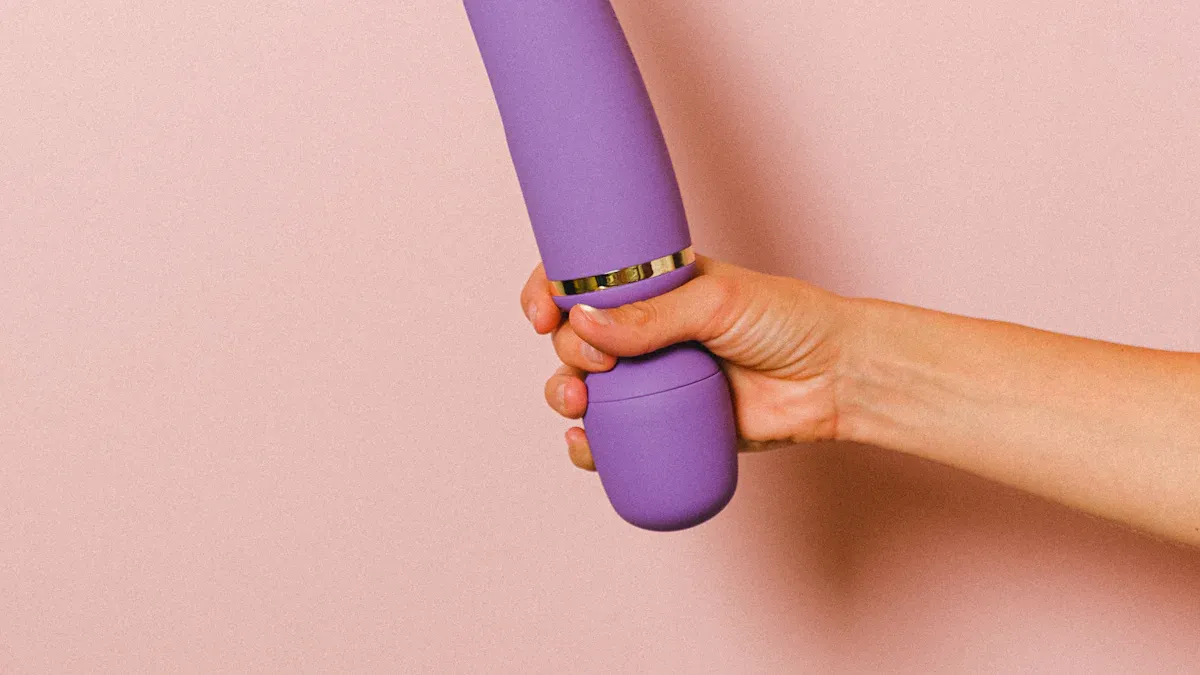Everything You Need to Know About Rubber Dildos Versus Other Materials

You may see that rubber dildos look and feel different from others. Rubber dildos are made from a soft and bendy material. This gives them a special texture and firmness. Some types, like Vibrating Dildo or Butt Plug Dildos, use rubber for their shapes. You can also find a glow in the dark dildo made from rubber. The material you pick can change your safety, comfort, and how much you like it. Nonporous materials like silicone, glass, or metal are easier to keep clean and safe. Porous materials like rubber can hold germs. The sex toy material you pick changes how you clean, use, and enjoy your dildo.
Rubber Dildos: Features
Types of Rubber Dildos
There are many kinds of rubber dildos you can buy. Jelly rubber dildos can be soft or firm. Newer ones are safer because they do not have bad chemicals like phthalates. Realistic dildos look and feel like a real penis. They have veins and textures for more feeling. Some rubber dildos have motors inside. These are called vibrating dildos and give stronger pleasure. Strap-on dildos use rubber and have strong bases for harness play with a partner. Double-ended dildos let two people use them at the same time. Non-realistic dildos are smooth and simple, so they are good for beginners. Each kind uses rubber in its own way, so you can choose what works best for you.
Firmness and Feel
Rubber dildos come in different levels of firmness. Some are soft and bendy, while others are stiff. Soft rubber dildos are comfy and flexible, which is nice if you are new to dildos. Firm rubber dildos give more pressure and stronger feelings. When you look at other materials, silicone dildos can be even softer or harder, and they are easier to clean. Glass and metal dildos are very hard and do not bend. The table below shows how each material feels and works:
Material | Firmness & Texture | User Experience Notes |
|---|---|---|
Rubber | Soft or firm, porous | Needs extra care for hygiene |
Silicone | Very soft to firm, flexible | Easy to clean, many texture choices |
Glass | Very firm, smooth or textured | Rigid, can be warmed or cooled |
Metal | Very firm, heavy, sleek | Intense, good for pressure, inflexible |
Tip: If you want a dildo that bends and feels soft, rubber dildos are a good pick. If you want one that is easy to clean, silicone might be better.
Porosity and Smell
Rubber is a porous material. This means rubber dildos can trap germs in tiny holes you cannot see. Because of this, you should use a condom with rubber dildos to stay safe. Porous materials like rubber, jelly, and PVC also keep smells. You might notice a rubber smell that does not go away, even after washing. Non-porous materials like glass, stainless steel, or medical-grade silicone do not have this problem. They do not hold germs or smells. When you pick a dildo, think about how easy it is to clean and if you mind a strong smell.
Material Comparison: Rubber vs. Other Sex Toy Materials

When you look at dildos, you will see many materials. Each material has its own safety, feel, and care needs. It is important to know how rubber compares to other sex toy materials before you pick one.
Silicone Dildos
Silicone sex toys are very popular. They are safe and easy to clean. Medical grade silicone is non-porous. This means it does not trap germs or bacteria. You can wash silicone dildos with soap and water. You can even boil them to make sure they are clean. This makes them great for using again and again. Silicone sex toys do not have strong smells. They do not have bad chemicals like phthalates. They are hypoallergenic, so most people will not get allergies. Silicone dildos come in many shapes, colors, and firmness levels. Some are soft and bendy. Others are firm. This gives you many choices for comfort and fun.
Note: Silicone sex toys are safe for your body and last a long time. You can use water-based or oil-based lube with them. Do not use silicone-based lube because it can hurt the toy.
Property | Silicone Dildos | Rubber Dildos |
|---|---|---|
Porosity | Non-porous | Porous |
Chemical Safety | Hypoallergenic, toxin-free | May contain phthalates, allergens |
Cleaning | Easy, can be boiled | Harder, not fully sterilizable |
Durability | Long-lasting | Breaks down faster |
Feel | Soft to firm, flexible | Soft or firm, can be sticky |
Maintenance | Low | High, use condoms for safety |
Silicone sex toys are special because they are safe and easy to care for. Rubber dildos are porous and may have unknown chemicals. You should always use a condom with rubber dildos to stay safe.
Glass and Metal Dildos
Glass and metal dildos are made from non-porous materials. They do not soak up germs or fluids. You can clean them easily. You can boil them or put them in the dishwasher to make them very clean. Glass dildos are made from strong glass that does not break easily. Metal dildos use stainless steel or aluminum. These are safe and last a long time.
Glass and metal dildos feel different from rubber or silicone. They are hard and do not bend. Some people like the smooth, firm feeling. These dildos can also get warm or cold for temperature play. Glass dildos are lighter than metal ones. Both types last a long time if you take care of them.
Glass and metal dildos do not trap germs.
You can use any kind of lube with them.
They are easy to clean and last for years.
These dildos are hard and do not bend with your body.
Rubber dildos are softer and bendy, but they break down faster and need more care.
Material | Safety Advantages | User Experience Advantages | Maintenance & Longevity |
|---|---|---|---|
Glass | Non-porous, hypoallergenic | Smooth, temperature play | Easy to sterilize, long-lasting |
Metal | Non-porous, hypoallergenic | Heavy, intense pressure | Easy to sterilize, very durable |
Rubber | Flexible, soft | Affordable | Porous, short lifespan, needs condoms |
Tip: If you want a dildo that is easy to clean and lasts a long time, glass and metal are good picks. If you want something soft and bendy, rubber dildos might feel better, but you must clean them well.
Plastic and TPR/TPE Dildos
Plastic dildos are usually made from ABS plastic. They are non-porous and safe for your body. They are hard, smooth, and easy to clean. You can use them for a long time without worrying about germs. TPR and TPE dildos are soft and bendy, like rubber, but they are porous. This means they can trap germs and break down over time.
TPR and TPE dildos feel soft and squishy, which some people like.
These materials do not have phthalates, but they can still hold germs and smells.
You need to clean them well after each use, but you cannot make them totally germ-free.
TPR and TPE dildos do not last as long as silicone or glass dildos.
Rubber dildos have the same risks as TPR and TPE, like being porous and having possible chemicals.
Material | Porosity | Chemical Safety | Feel | Hygiene & Durability |
|---|---|---|---|---|
TPR/TPE | Porous | Phthalate-free, but can harbor bacteria | Soft, flexible | Needs careful cleaning, short lifespan |
Rubber | Porous | May contain phthalates, chemically uncertain | Soft, variable | Porous, less safe, short lifespan |
Plastic | Non-porous | Phthalate-free, hypoallergenic | Hard, smooth | Easy to clean, durable |
Note: If you want a sex toy that is easy to clean and lasts a long time, pick plastic or silicone sex toys. If you want a softer feel, TPR, TPE, or rubber dildos might work, but you must clean and store them carefully.
When you compare materials, you will see that non-porous sex toy materials like silicone, glass, metal, and plastic are safer and easier to care for. Porous materials like rubber, TPR, and TPE need more care and may not last as long. Always think about safety, cleaning, and how each material feels before you choose your next dildo.
Body-Safe Dildo Material and Health
Allergies and Sensitivities
Picking a body-safe dildo material helps you avoid allergies. Some people are allergic to latex. This can make your skin itch, turn red, or swell up. Rubber dildos might have latex or other things that cause allergies. If your skin is sensitive, pick non-porous and hypoallergenic toys. Medical-grade silicone, borosilicate glass, stainless steel, ABS plastic, and Lucite are good choices. These materials do not hide bad chemicals or allergens. Always read the label and buy from brands you trust to stay safe.
Chemical Content and Safety
You should think about what chemicals are in your dildo. Many rubber dildos have phthalates. Phthalates make toys soft and bendy. But phthalates can hurt your health. They are linked to problems with hormones, fertility, and even cancer. Some rubber toys have other bad chemicals like toluene or cadmium. These can hurt your nerves and organs. Non-porous materials like silicone, glass, and ABS plastic do not need these chemicals. Silicone sex toys are safe because they do not have toxins and are non-porous. Always look for toys that say phthalate-free. But only non-porous, body-safe dildo material gives you the best safety.
Tip: Using a condom with rubber or porous toys helps keep you safer from germs and chemicals.
Hygiene and Infection Risks
Porous toys like rubber, jelly, and PVC can trap germs inside. Even if you wash them, germs can stay hidden. This makes it hard to keep them really clean. Bacteria and viruses can hide in tiny holes. This raises your risk of infections like yeast infections, UTIs, or even STIs if you share toys. Non-porous toys made from body-safe dildo material, like medical-grade silicone or glass, are much easier to clean. You can wash them with soap and water or even boil some for extra safety. If you use a porous toy, always put a condom on it. Never share it between partners or switch between vaginal and anal use without cleaning it first. Picking a non-porous, body-safe toy helps keep you healthy every time.
Remember: Non-porous, body-safe dildo material is the best for easy cleaning and long-term safety.
Cleaning and Care for Dildos

Cleaning Rubber Dildos
You need to clean rubber dildos carefully because they are porous. This means germs can hide inside the material. Always wash your rubber sex toy before and after each use. Use warm water and a mild, unscented soap or a special toy cleaner. Avoid harsh chemicals or strong fragrances. These can damage the rubber and irritate your skin.
Follow these steps for best results:
Rinse the dildo with room temperature water.
Apply a gentle soap or toy cleaner using a soft cloth.
Wipe the surface gently. Do not scrub hard.
Rinse off all soap and let the toy air dry completely.
Check for cracks or changes in color. If you see any, replace the toy.
Tip: Use a condom with rubber dildos, especially if you share them. This helps keep things cleaner and safer.
Cleaning Other Materials
Nonporous dildos, like those made from silicone, glass, or metal, are much easier to clean. These materials do not trap germs. You can wash them with mild soap and water. For extra safety, you can boil silicone, glass, or metal dildos for a few minutes. Some can even go in the dishwasher (top rack, no detergent).
Here is a quick guide:
Material | Cleaning Method |
|---|---|
Silicone | Soap and water, boil, or dishwasher |
Glass | Soap and water, dishwasher safe |
Metal | Soap and water, boil, or dishwasher |
Rubber | Soap and water, gentle cleaning only |
Always check if your sex toy has electrical parts. Never boil or soak toys with batteries or motors.
Storage Tips
Proper storage keeps your dildos safe and clean. Always let your toys dry fully before putting them away. Store each toy in its own soft, lint-free bag or cloth wrap. This stops germs from spreading and prevents material damage. Keep your toys in a cool, dry place away from sunlight and heat. Avoid damp spots like bathrooms.
Check your toys often for cracks or changes. Replace them if you see any damage.
Note: Good storage habits help your toys last longer and keep you healthy.
Choosing the Best Dildo Material
Pros and Cons of Rubber Dildos
Rubber dildos are popular, but they have good and bad sides. Many people like them because they are soft and bendy. They usually cost less than other kinds. You can find rubber dildos in lots of shapes and sizes. But rubber is porous. This means germs can get trapped inside. It is harder to clean rubber dildos. Some rubber dildos might have chemicals that are not safe for your body. Always use a condom with rubber dildos to help stop infections.
Aspect | Pros/Neutral Points | Cons/Warnings |
|---|---|---|
Material Safety | Cheap, flexible, many choices | Porous, may have unsafe chemicals, hard to clean |
Infection Risk | Use condoms to lower risk | Holds germs, higher chance of infection |
Cleaning & Maintenance | Wash after every use | Hard to clean fully, can get ruined by heat or sun |
Usage Recommendations | Good for trying new feelings | Not good for sharing or using for a long time |
Tip: If your rubber dildo smells strong or feels sticky, it might not be safe to use.
Pros and Cons of Other Materials
There are many other dildo materials you can pick. Silicone, glass, and metal dildos are great for most people. Silicone dildos are soft, do not let germs in, and are easy to wash. Glass and metal dildos are smooth, safe for your body, and last a long time. These dildos do not trap germs and are easy to make very clean. TPR and TPE dildos feel soft but are also porous and harder to keep clean.
Material | Pros | Cons |
|---|---|---|
Silicone | Non-porous, easy to wash, many textures, body-safe | Needs water-based lube, usually costs more |
Glass | Non-porous, smooth, can be warm or cold, easy to clean | Hard, can break if dropped |
Metal | Non-porous, heavy, good for pressure, easy to clean | Can feel cold, costs more |
TPR/TPE | Soft, bendy, cheap | Porous, hard to clean well, less safe |
Note: The best dildo material for you depends on what you need, but non-porous dildos are safer and easier to care for.
Matching Material to Your Needs
Think about your body and how you want to use your dildo. If you have allergies or sensitive skin, pick non-porous dildos made from medical-grade silicone, glass, or metal. These materials help stop skin problems and infections. Never use dildos with strong smells or sticky parts. These signs mean the material is not safe. If you want a dildo that is easy to clean, choose silicone, glass, or metal. Use water-based lube with silicone dildos. You can use any lube with glass or metal dildos. Always wash your dildos after each use and keep them dry.
Pick non-porous dildos for safety and easy cleaning.
Stay away from dildos with phthalates or BPA.
Test new dildos on your skin before using them all the way.
Use condoms with porous dildos to help keep you healthy.
Remember: The best dildo material keeps you safe, feels nice, and fits what you want.
When you choose a dildo, material matters for your health and comfort. Rubber dildos often cost less, but they can trap bacteria and may contain unsafe chemicals. Non-porous options like silicone, glass, and metal are safer, easier to clean, and last longer.
Think about what feels best for your body and how much care you want to give your toy.
Always check for strong smells or unclear labels.
Your safety and satisfaction come first. Pick a trusted brand and the right material for your needs.





